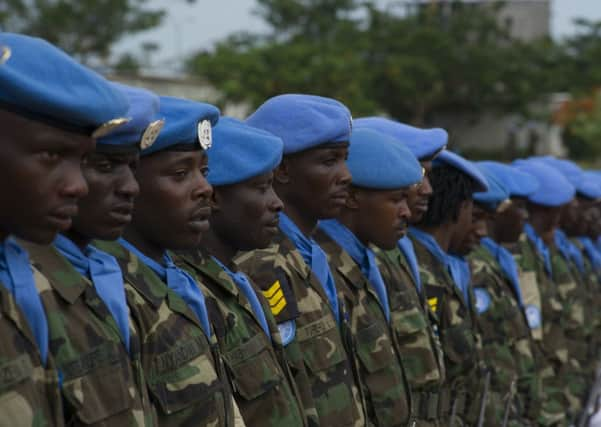Sudan tells UN to leave over mass rape claims


The government said claims that allegations of a mass rape in the region of Darfur – where it has been at war with rebels for more than a decade – have strained relations are not true.
The UN’s peacekeeping chief Hervé Ladsous told the Security Council that a UN team met its Sudanese counterparts this week to discuss an exit strategy, after Sudan’s government called for the mission to go.
Advertisement
Hide AdAdvertisement
Hide AdTensions are high over the UN’s attempts to investigate the reported rape of 200 women and girls in a Darfur village by government-allied troops.
The Sudanese government, under president Omar al-Bashir, last month demanded that the mission remove two human rights experts from a Khartoum liaison office, which Mr Ladsous called “unacceptable”. Now it has told the UN mission not to work with local officials without checking with the foreign ministry, the UN peacekeeping chief said.
Sudan’s UN ambassador, Rahamtalla Elnor, said it was time to discuss a departure, saying a national dialogue would bring peace to Darfur.
The rape investigation is the latest source of friction between Sudan and the deeply troubled 20,300-strong peacekeeping force in Darfur.
The joint UN-African Union peacekeeping mission at first said its investigation had found no evidence of a mass rape in Tabit village, but the UN special representative on sexual violence in conflict said a heavy military presence during the visit could have affected its findings.
The Security Council then demanded that Sudan allow a full investigation.
The government called the current peacekeeping mission unprofessional and gave council members the results of its own investigation. An executive summary obtained by the Associated Press news agency said a prosecutor’s team had questioned 88 people in the village and found no evidence of rape.
The summary states: “The women of Tabit live under the wing of men. No such grave crimes could have happened while men would not move a finger or have some reaction.”
Advertisement
Hide AdAdvertisement
Hide AdIt says those questioned were “outraged by the tarnishing of their reputations” and that women in the village had filed a complaint to UN secretary-general Ban Ki-moon.
Mr Ban’s spokesman said a letter from Sudanese women’s groups was sent to a high-ranking UN official in Sudan and on to the UN chief’s office.
“The government of Sudan definitely has nothing to be accused of,” Mr Elnor later said.
Sudan’s report appeared not to answer some council members’ concerns. “Would a woman admit she was raped with soldiers looking over her shoulder? Unbiased investigation needed,” council member Lithuania tweeted after the meeting.
The Darfur mission has the second-highest budget of all UN peacekeeping forces, at more than £833 million a year, but it has faced persistent criticism about its effectiveness.
Early this year, the Security Council ordered a review of its work and asked Mr Ban to suggest options for the mission’s future, including an exit strategy, by the end of February.
The council on Thursday urged Sudan’s government to co-operate fully with the mission. The UN said its inquiry into mass rape allegations in Darfur had been inconclusive and needed further investigation.
Mr Ladsous said a team from the joint UN and African Union peacekeeping force in Darfur needed to return to Tabit “in part due to the heavy presence of military and police” during their first visit several weeks ago. But Sudan has refused to allow the team to go back.
Law and order have collapsed in much of Darfur.